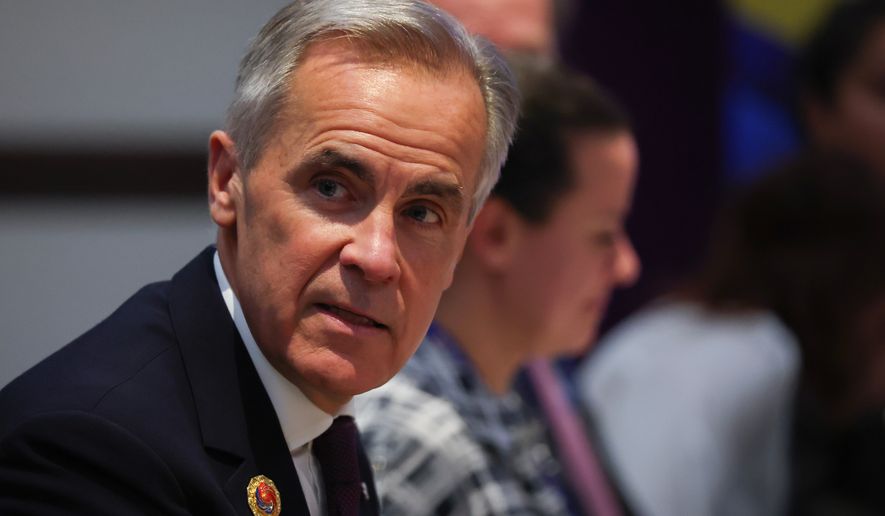President Trump secured trade pacts with Southeast Asian nations, smoothed out relations with Brazil, and is nearing a trade truce with China during a trip through Asia.
Yet his biggest trade fight is much closer to home, and with the unlikeliest of foes — Canada.
Mr. Trump said Monday he does not plan to meet Canadian Prime Minister Mark Carney during a summit in South Korea because he is seething over an Ontario-sponsored ad that used President Ronald Reagan’s words to attack tariffs.
“I don’t want to meet with him. I’m not going to be meeting with him for a long time,” Mr. Trump said en route to Japan from Malaysia.
In the same breath, the U.S. president said he would be happy to meet with North Korean leader Kim Jong-un while he’s in the neighborhood in South Korea.
The president’s comments signal that trade talks with Canada will remain stuck, even as the U.S. calms a high-stakes feud with Beijing and finalizes a long-awaited trade pact with Seoul.
“I’m very happy with the deal we have right now with Canada,” Mr. Trump said. “We’re gonna let it ride.”
“One of the most difficult countries to deal with has been Canada, as much as I love Canada itself and the people of Canada,” he added.
Mr. Trump is angry about Ontario’s decision to run an ad featuring clips of a 1987 speech by Reagan, a hero to U.S. conservatives.
In the speech, Reagan says tariffs can be useful in limited circumstances. But his overall message, which is highlighted in the ad, is that broad tariffs can lead to retaliation and economic turmoil.
Tariffs are central to Mr. Trump’s second-term agenda, so he saw the ad as a thumb in his eye during trade talks with Canada.
“That’s dirty pool, and let me just tell you they shouldn’t have done it,” Mr. Trump told reporters.
Matthew J. Lebo, a political science professor at Western University in Ontario, said using Reagan’s viewpoint “hits Trump in a few ways he is sensitive about.”
“It is designed to affect public opinion about tariffs and Trump himself, especially among Republicans who still see Ronald Reagan as a great American president,” Mr. Lebo said. “The ad is meant to pressure not only Trump, but Republican legislators, especially those facing tough reelection battles next year, whose constituents may be hurt by tariffs.”
Mr. Trump says tariffs, or duties imposed on foreign goods brought into U.S. markets, are a great way to create revenue, gain leverage in foreign negotiations and protect U.S. industries.
Critics say tariffs add costs that harm small businesses and can be passed along to consumers, while leading to cycles of retaliation that worsen those economic costs.
Ottawa has been trying to reduce the 35% tariff that Mr. Trump imposed on many Canadian products, plus high levies on things like steel, aluminum, cars and car parts.
Mr. Trump plans to slap an additional 10% duty on Canadian goods because of the Reagan ad.
“I don’t know when it’s going to kick in. We’ll see,” the president said.
Ontario Premier Doug Ford said he would pull the ad on Monday to allow space for trade talks.
“We stand ready to sit down with the United States, myself with the president, my colleagues with their colleagues, when the U.S. is ready to sit down,” Mr. Carney told reporters in Japan.
Mr. Carney said both sides had made “considerable progress” before the Reagan spat.
The on-again, off-again nature of U.S.-Canada trade relations might continue for a while, given Mr. Trump’s negotiating style.
“I would expect to see more highs and lows on the U.S.-Canada relationship,” said Andrew Latham, a political science professor at Macalester College in Minnesota. “Trump views volatility as a source of leverage over trading partners. If you’re keeping score at home, he is uninterested in predictability and views compromise as a sign of weakness.”
Mr. Carney plans to meet Chinese President Xi Jinping in South Korea to discuss trade and other matters.
Mr. Lebo said that’s consistent with Mr. Carney’s stance since taking office, specifically “that Canada needs to reposition its trading relationships so that it relies less on the U.S. as a customer for Canadian goods and services.”
Mr. Trump will sit down with Mr. Xi on Thursday to resolve thorny trade issues involving China’s crackdown on rare earth elements and a U.S. threat to impose 100% tariffs in response.
Treasury Secretary Scott Bessent said both sides reached a “very substantial framework” in which the U.S. would withdraw its threat to impose a 100% tariff, while Beijing would shelve its plans to restrict rare earth exports.
Mr. Trump said he made progress with Brazilian President Luiz Inácio Lula da Silva. Mr. Trump is imposing a 50% tariff on Brazilian goods, partly due to the country’s prosecution of ex-leader Jair Bolsonaro.
“They’d like to do a deal. We’ll see,” Mr. Trump said. “But we had a great meeting.”
Trump administration officials are close to finalizing a trade deal with South Korea, and they recently announced trade and minerals deals with the Southeast Asian nations of Cambodia, Malaysia, Thailand and Vietnam.
Canada, meanwhile, will have to wait.
“That Trump is willing to meet with the North Korean dictator but not the Canadian prime minister,” Mr. Lebo said, “is another sign of how far foreign and trade policies are from how Ronald Reagan saw the world.”
• Tom Howell Jr. can be reached at thowell@washingtontimes.com.




Please read our comment policy before commenting.